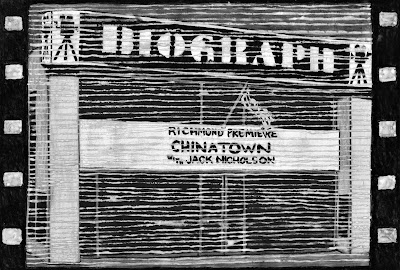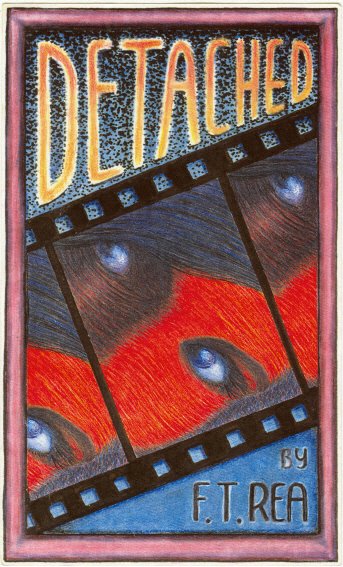Note: This piece was first published 17 years ago by Richmond.com (Feb. 16, 2000).
*
Anniversaries
are knives that can cut both ways. Although we may raise the glass to
remember certain events, sometimes we end up drinking to forget. Since I
tend to dwell on the calendar more than I should, last Friday afternoon
I was in a somber mood.
Then, shortly after 4 p.m., I
received an e-mail from a friend who lives in D.C. Until then, I hadn't
realized that I had been fretting all day over the notion that I was
alone in remembering that it was the Biograph Theatre's 28th
anniversary. Upon looking at the e-mail, I smiled.
On
Feb.11, 1972, the Biograph Theatre at 814 W. Grace St. was set in motion
by a gem of a party. The first feature presentation was a French
war-mocking comedy, "King of Hearts" (1966). On the screen, Genevieve
Bujold was dazzling opposite the droll Alan Bates. In the lobby, the Fan
District's version of "beautiful people" was assembled. The
champagne flowed and the flashbulbs popped.
As the new cinema house's first manager, at 24, this yarn's recounter was convinced he had the best job in the Fan District.
Repertory
movie theaters such as the Biograph became popular in large cities and
college towns in the late '60s and early '70s. The fashion of the era,
driven by a film-buff in-crowd, elevated many foreign movies, certain
American classics, and selected underground films above their
current-release Hollywood counterparts. A repertory cinema's regulars
viewed most of the product coming out of Hollywood then as naïve or
corrupt.
For me, the gig lasted nearly 12 years,
including five years of Rocky Horror midnight shows. Four years after my
departure, seven years after the arrival of cable TV in Richmond, the
Biograph's screen went dark in December '87. Times had changed and the
theater could no longer pay its way.
But in that little
independent cinema's heyday, Feb. 11 meant something to those familiar
with the nightlife in the VCU area. The Biograph's second anniversary
was the party that established the occasion of the theater's birthday as
a date to mark on the calendar. That was the year of The Devil Prank.
Following
a circuit court judge's well-publicized banning of a skin flick, "The
Devil in Miss Jones" (1973), we booked an old RKO light comedy with a
similar title - "The Devil and Miss Jones" (1941) for a one-day event.
A
press release announced that the theater was throwing a party to
celebrate the anniversary of its opening day, admission would be free,
and the titles of the movies were listed. (A Disney nature short subject
- entitled "Beaver Valley" - was added to flesh out the program.)
As
planned, no one at the theater answered any questions from the public
or the media about the nature of the shows. The people who didn't notice
the difference in the two titles were left to assume whatever
they liked.
On the day of the party the staff decorated
the lobby with streamers and balloons, laid out the birthday cake, and
tested the open keg of beer. Spurred on by news reports of the
Biograph's supposed intention to defy a court order, hundreds were in
line by lunch time.
By show time, 6:30 p.m., the line
of humanity stretched almost completely around the block. Thousands of
people were waiting to see a notorious X-rated movie without knowing a
Jean Arthur/Bob Cummings comedy was going to be shown instead.
The
atmosphere was electric when I unlocked the front. Only the first
500 in line could be admitted because that was the auditorium's seating
capacity. Later on, contrary to what I had expected, the audience didn't all get
the joke at once. The realization came in waves.
Most
of those who were admitted enjoyed the night, one way or another. The
movies had to be funnier in that context than ever before, as long as
you could laugh at yourself. To wash down the taste of the hoax, free
beer was available.
Of course, there were a few people
who were still miffed, but so many more loved being in on such a massive
joke that the grumbles hardly mattered.
The story of
the stunt hit the wire services and it appeared in newspapers all over
the country. NPR did a piece on it. Needless to say, the frothy
publicity only added to the luster of what was truly a unique night.
In
subsequent years, the occasion of the annual party served as a reunion
for everyone who had ever worked or hung out at the theater. Sometimes
special films were brought in for a screening, or a band would play
after hours.
Another anniversary that was rather
unusual was the tenth. In 1982, a Louis Malle film that had been shot in
the Jefferson Hotel was in its initial release. We booked the picture
to open on Feb. 11 and combined with VCU's Anderson Gallery to stage a
party that served as a benefit for the art gallery.
"My
Dinner with Andre" was a movie about two friends talking over dinner.
The actual meal they ate in the movie was provided by a local caterer
named Chris Gibbs. He also created restaurants such as Gatsby's, Fifth
Avenue, and Winston Churchill's. Each day of the movie's shooting
schedule, the flamboyant Gibbs would show up at the set with another
batch of Cornish Hens and wild rice for the actors to pick over as they
spoke their lines.
For our party, Gibbs served the art
movie/art gallery patrons the same dinner as the actors on the screen
were having. It went over like gangbusters. The local media ate it up,
which of course validated the notion that a good time was had by one and
all.
Naturally, since then, the theater closed and the
tradition has atrophied. There was a small party for the 20th
anniversary even though the cinema's screens had long been dark.
Back
to the e-mail that made my day - here's how it worked: A few weeks ago,
Style Weekly ran an interview with singer/songwriter Aimee Mann, a
Richmond native and former lead singer of the '80s New Wave band 'Til
Tuesday. The article mentioned her recent success with the song "Save
Me" from the movie "Magnolia." Among her fond memories of Richmond, she
spoke of having enjoyed going to the Biograph as a teenager.
Aimee
looks familiar, but I don't really remember her from her Open High
School days (in the late '70s). I sent the article to the friend I
mentioned, Ernie Brooks, because I knew he was enthusiastic about
"Magnolia."
Brooks, a regular at the Biograph in the
'70s, subsequently attended Mann's recent performance at the Birchmere
in Alexandria. During a break, he presented her with an almost
never-worn Biograph T-shirt from his collection.
Ernie
claims she was nearly overwhelmed by his gesture. However, in spite of
what my experience tells me about such stories, I'm choosing to believe
him.
In turn, she autographed a copy of her "Magnolia"
CD for him. Ernie then e-mailed me a scan of it attached to an account
of his conversation with Aimee.
On the cover art she had written - "To the Biograph, many memories, Love Aimee."
Upon
seeing her simple message, my frame of mind changed instantly. Instead
of letting mid-February's inevitable dreariness continue to bum me out,
it even occurred to me how lucky I was to have been in on the adventure
the Biograph was.
Because of a quirky art-movie
connection, facilitated by way of an old friend of the Biograph, a
willowy blond from the past beamed me a pleasant mood swing: a virtual
happy anniversary present.
Thanks, Aimee. And
congratulations on your Best Original Song Oscar nomination for "Save
Me." I'll be watching to see what you are wearing on Oscar presentation
night.
Ain't life grand?
-- 30 --
















